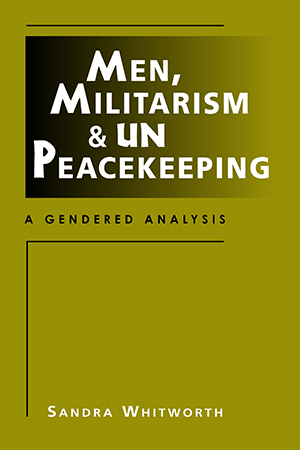Sandra Whitworth looks behind the rhetoric to investigate from a feminist perspective some of the realities of military intervention under the UN flag.
Whitworth contends that there is a fundamental contradiction between portrayals of peacekeeping as altruistic and benign and the militarized masculinity that underpins the group identity of soldiers. Examining evidence from Cambodia and Somalia, she argues that sexual and other crimes can be seen as expressions of a violent "hypermasculinity" that is congruent with militarized identities, but entirely incongruent with missions aimed at maintaining peace. She also asserts that recent efforts within the UN to address gender issues in peacekeeping operations have failed because they fail to challenge traditional understandings of militaries, conflict, and women.
This unsettling critique of UN operations, which also investigates the interplay between gender and racial stereotyping in peacekeeping, has the power to change conventional perceptions, with considerable policy implications.
Sandra Whitworth is professor of political science and women's studies at York University.
No rights in South Asia."Deftly combines the theoretical with the practical analysis of soldier training and military culture."—Cheryl Koos, Left History
"Sandra Whitworth has written a compelling book.... Though writing from a feminist perspective, she provides a balanced look at the institutions of the military and the United Nations.... [This] is definitely a feminist look and critique of the current business of peace operations, but it is one that policy makers of all nations, and especially those in the United Nations, should consider."—Darlene Iskra, Armed Forces & Society
"The critical questions [Whitworth] raises enrich the debate over how best to deal with threats to international peace." Margaret P. Karns, Perspectives on Politics
"An important contribution to our understanding of peace operations."—Paul Williams, International Affairs
"A provocative and disturbing account of how soldiers and the military have responded to the sometimes contradictory requirements of peace operations. Whitworth's feminist analysis questions our assumption that warriors are able to bring—or keep—peace."—Simon Chesterman, International Peace Academy
"Whitworth digs deep into the cultural politics of internationalized war, peace, and security. She asks—and answers—feminist questions about soldiering, about national myths, and about internal UN dynamics in graphic ways that make this compulsory and gripping reading."—Cynthia Enloe, Clark University






